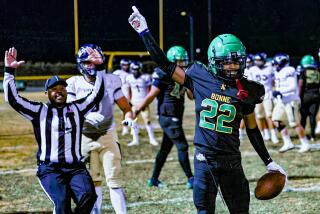So. Carolina Off the Hook on Steroids : Athletics: Football program escapes NCAA sanctions on rules violations in scandal that brought prison terms for three coaches.
- Share via
COLUMBIA, S.C. — South Carolina’s football program escaped sanctions today as the NCAA announced it found no serious rule violations resulting from a steroid scandal which led to prison terms for three former assistant coaches.
However, the NCAA extended by six months the two-year probation for the men’s basketball program, which began in 1987 and was to have ended in 1989.The probation was the result of a scheme in which athletes sold complimentary tickets to boosters. The NCAA said it wanted to review the 1990 fall semester results of a 17-point monitoring and compliance program instituted after the probation.
The decision on the football program lifted a cloud that has hung over the school for two years since an article in Sports Illustrated by an ex-Gamecock player alleged that steroid use was widespread.
“I feel the weight of the world has been lifted off my shoulders,” Athletic Director King Dixon said.
The NCAA said the school failed to adhere to its lifestyles drug-testing program for athletes from 1985 to 1987. An in-house task force also reached the same conclusion, which led to the firing of Athletic Director Bob Marcum in March, 1988.
The NCAA said it also found two secondary violations, one involving football, the other men’s basketball. Dixon refused to disclose the violations.
“It should be noted, however, that if the committee had determined that individuals in the athletics administration had been aware of violation, the (Infractions) Committee would have considered the case to be major in nature,” the NCAA report said.
In a report sent to the NCAA on Jan. 1, the university said that it uncovered a half dozen possible rule violations and found “widespread experimentation” with steroids from 1983 to 1987. The report found that at least two coaches paid for the muscle-building drugs for players on four occasions. It also revealed for the first time that two former players sold their complimentary tickets.
The university began its probe after a first-person article by ex-South Carolina defensive lineman Tommy Chaikin in an October, 1988, issue of Sports Illustrated. Chaikin, who played at South Carolina from 1983 to 1987, wrote that as many as half the players on the 1986 team used steroids.
More to Read
Go beyond the scoreboard
Get the latest on L.A.'s teams in the daily Sports Report newsletter.
You may occasionally receive promotional content from the Los Angeles Times.










